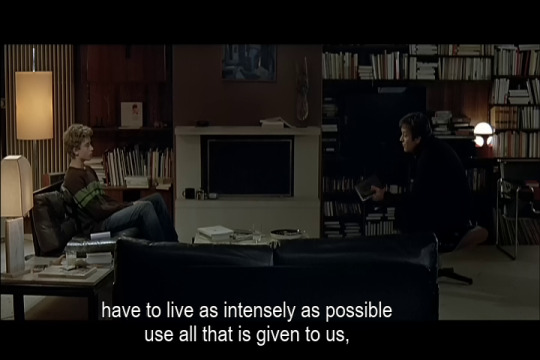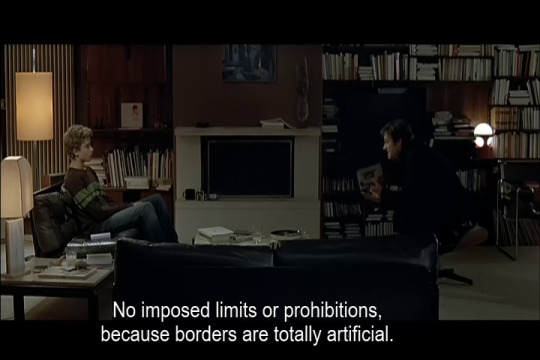Text
The Collected Paintings Mini Book of Trigun Maximum by Yasuhiro Nightow
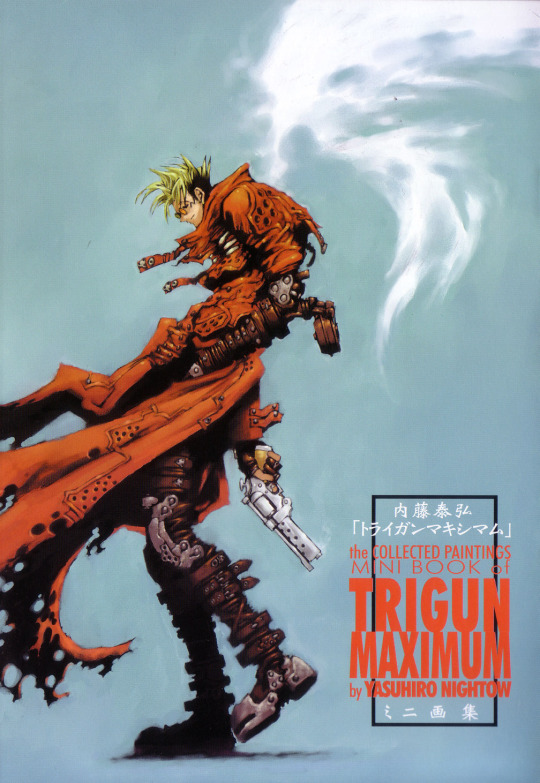


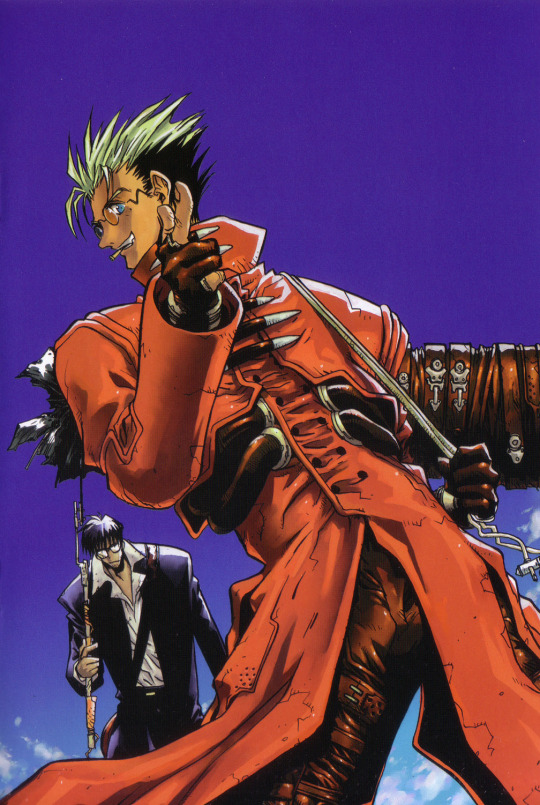

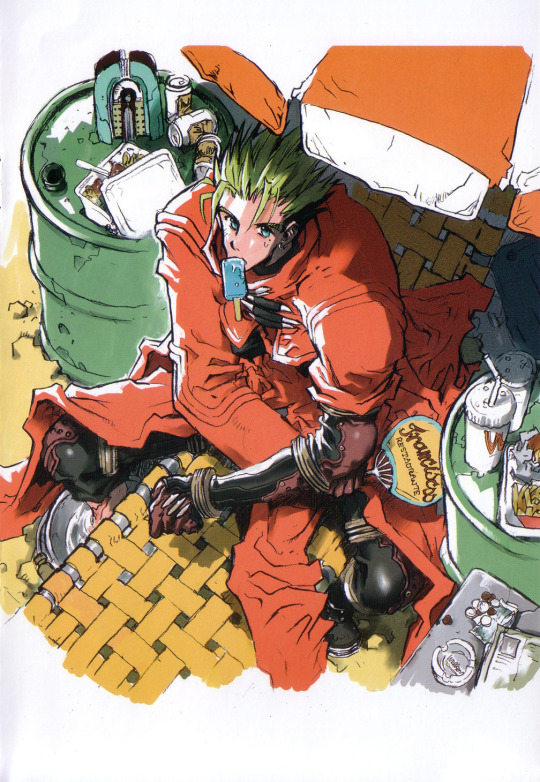

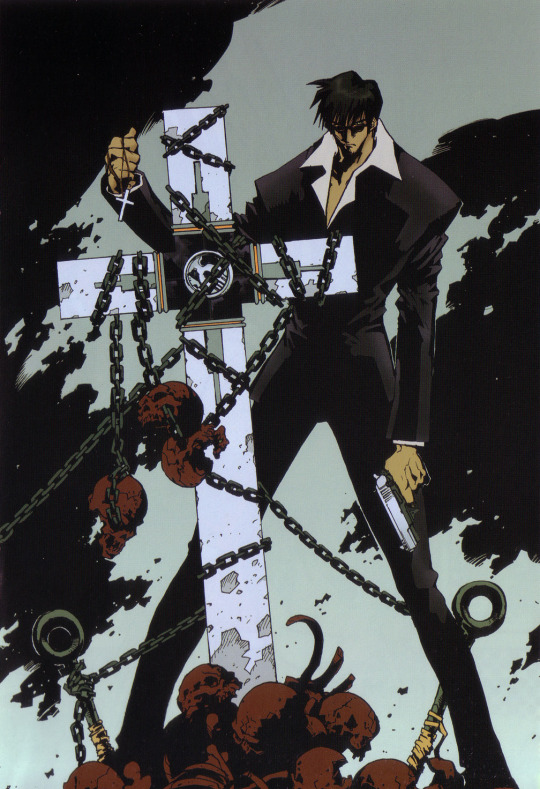
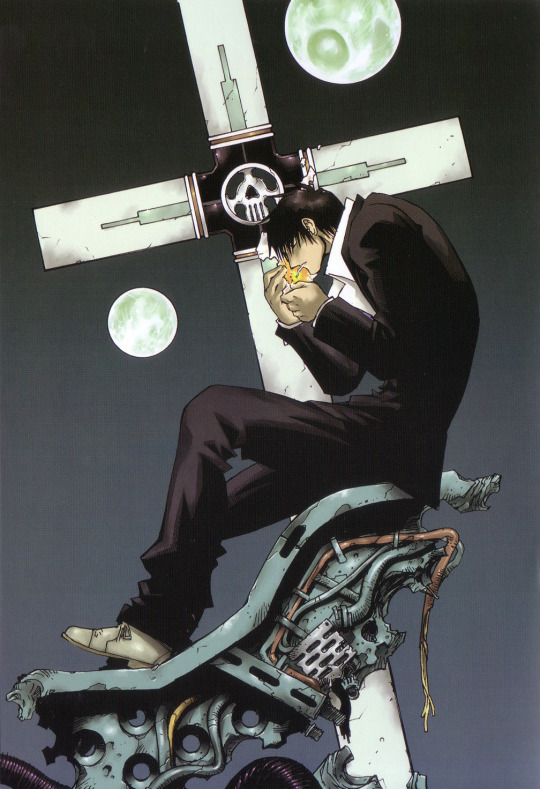


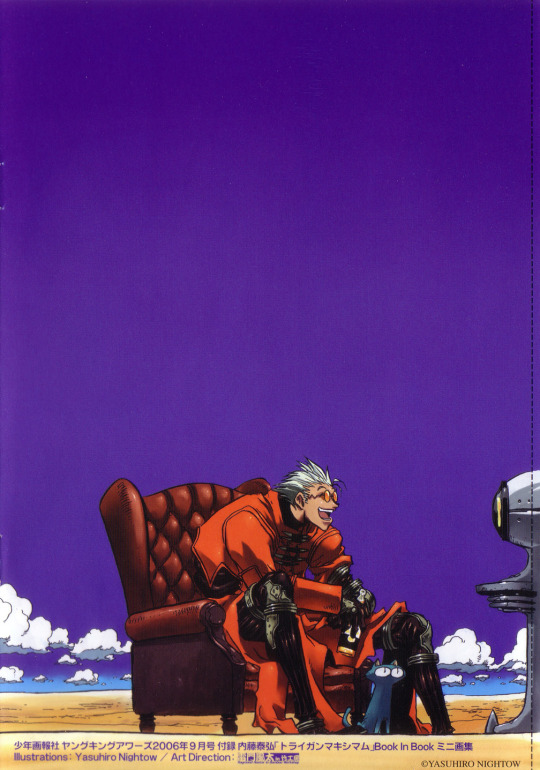
4K notes
·
View notes
Text
The Cog Narrative
An exhaustive analysis of Yuji's role as a cog to defeat curses, and an explanation for why Gege has not given him any significant power ups, and likely never will. I analyze Mahito and Sukuna alongside one another as foils to Yuji to compliment Yuji's promise to kill curses.


Yuji first comes to the terms with his role within the story after he defeats Mahito. He calls himself a cog meant to kill curses. Yuji's existence as a cog suggests a system that he feels he belongs to, which I will refer to generally as jujutsu society. In the beginning, Sukuna ruled jujutsu society, and his impact still remains, causing a schism between sorcerers. Still, the system has changed since the Heian era; where Sukuna once ruled with might, Jujutsu High now rules with political domination.
Sorcerers by nature wish to save people, and curses juxtapose them. Despite the changes in how sorcerers rule themselves, curses remain the same. Yuji's fight with Mahito helps him understand that a curse's true nature lies in their need to spread misery. While Sukuna isn't technically a curse, he still believes in spreading misery like one.


Mahito demonstrates the hunger for destruction that Sukuna describes as the ingredients for true strength. Uro's comments repeat this same idea. She's witnessed Sukuna's might for herself and saw him cull her squad of assassins before she was executed to deter Sukuna's ire.

Gege has been consistent throughout the series about what makes people like Mahito and Sukuna strong; their willingness to destroy everything and everyone, and the pleasure it gives them, literally and figuratively defines their existence as curses. Both promise to remain negative forces that will haunt humanity until something kills them. When Mahito kills Nanami and Nobara, he relishes in the despair it causes Yuji. The immense pleasure killing and causing despair grants him drives him to spread even more misery. As a result, he gains further understanding of his soul's essence and unlocks more strength. Gege directly ties a curse's strength to how they prioritize their desire to cause and spread misery above anything else.



Like Mahito, Sukuna thrives on the misery he causes. Though, Sukuna sees himself as a divine arbiter who bestows judgement on humans, who he deems to be beings below him. As a divine figure, he condemns humans to misery by his hands. Sukuna's title as the "disgraced one/the fallen," and his talent to forgo a barrier for his domain expansion reflect his defiled divinity. Gege describes Sukuna's domain expansion as a truly divine technique, which adds even more grandeur to his role as the strongest sorcerer in history. Sukuna's undefeated reign of terror ultimately defines his status as a divine sovereign of jujutsu sorcery.
As the symbol of the greatest force in the history of sorcery, Sukuna enforces a schism within jujutsu society. In the Heian era, and now in the modern era, Sukuna spurs the rule of might. By threatening carnage, he forces sorcerers to come and meet him in battle to test their strength and knowledge against his own. To avoid the calamity Sukuna threatens, sorcerers must either kneel to him or hope to defeat him. In the Heian era, most of the sorcerers likely chose the former after failing to succeed at the latter. After armies of sorcerers died against him, jujutsu society was forced to praise him as their divine sovereign.

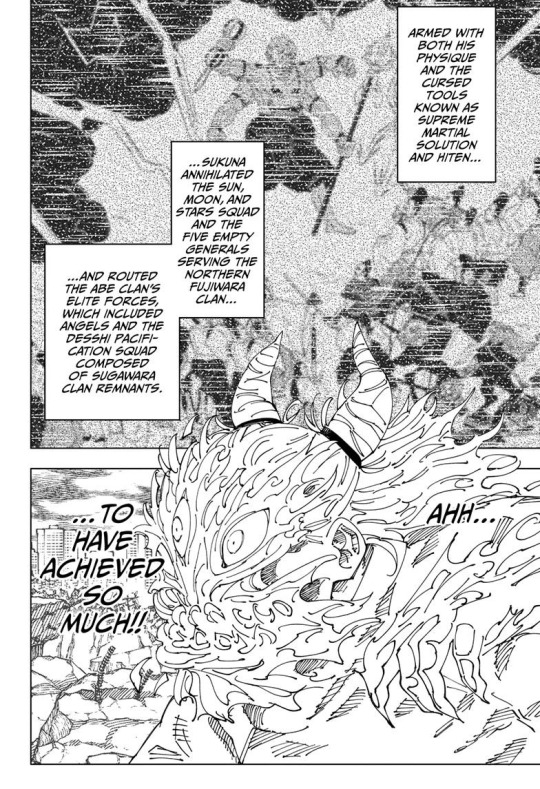

The Yorozu panel reveals that Uro once led the Sun, Moon, and Stars squad that Sukuna slaughtered. The second and third pages above describe Uro's squad as powerful sorcerers who challenged Sukuna and died. Yorozu also once challenged the Fujiwara clan and they made her one of their nobles*. Uro detested the very same Fujiwara clan who apparently subjugated her.
The manga isn't very specific about what Yorozu's status was, just that she was some type of noble in the Heian capital.



After he annihilated Uro's squads, Sukuna became the supreme divine sovereign of jujutsu society in the Heian era and sorcerers were forced to worship him to avoid his ire. To stress his divinity, sorcerers prayed to him for a good harvest as if he were a God. The Fujiwara clan likely executed Uro, a leader of some of the forces that challenged Sukuna, to appease their new divine sovereign. The fealty that was pledged to him likely made Sukuna extremely bored. He wished to spread misery, but his opponents had all lost the will to challenge him and instead begged and worshipped at his feet.
Sukuna represents a solitary strength that directly juxtaposes Yuji's. As a cog, Yuji depends on others to help him achieve his role as a means to curses' ends. Against Mahito, Nobara's soul resonance granted Yuji an opening, and left lasting damage that was crucial to the curse's defeat. Yuji shamelessly depends on his friends to help him. He hardly ever fights alone and often gets paired with fighters stronger than him, especially against Sukuna. Yuji's team up with Maki, Higuruma, and Yuta drives forth not only Yuji's dependance on others' help, but also his direct contrast to both Mahito and Sukuna.



Mahito was the last of the disaster curses who remained in Shibuya after Hanami, Dagon, and Jogo were killed. Similarly, Sukuna fights alone in Shinjuku. The disaster curses' defeat demonstrates how Gege leaves room for both Sukuna and Yuji to be correct. Hanami, Dagon, and Jogo were all defeated by powerful people who represent solitary and unreachable strength; Gojo, Toji, and Sukuna all occupy the role as the strongest at the time in their respective lanes. Toji, before Maki's awakening, represented the pinnacle of strength beyond jujutsu. Gojo represents the strongest sorcerer of the modern era, and Sukuna the greatest in history and the Heian era. Despite them being alone, all three yielded better results than Yuji working alongside Nobara and Todo. In Jujutsu Kaisen, teamwork does not always work better than one strong person fighting alone.
In Jujutsu Kaisen, Gege allows both teamwork and isolation to breed innovation and evolution. Gege prioritizes a narrative focused on depicting clashing ideas more than anything else. For many characters, like Mahito and Yuji, victory represents the strength and vindication of one's convictions. If Mahito had won his battle against Yuji, that would have provided Mahito proof of his right to slaughter as he pleases. Because for him and Sukuna, might is right. In an interview, Gege reiterated my findings.



Gege allows for both heroes and villains to prove their ideas' worth against one another by allowing a story where both sides suffer similar casualties. Gege will often create a disparity favoring the villains in order to spin a story of triumph over malevolence.
The give and take often suffered by both heroes and villains define the jujutsu society that all the characters belong to. The system includes curses who thrive on spreading misery onto humans, as well as sorcerers who refuse to give into the despair caused by their enemies. The constant ebb and flow between good and evil represents the system that Yuji belongs to as a cog.
Sorcerers and Cogs
Clashes between benevolent and malevolent convictions define jujutsu society as a system built by Sukuna's rule of might. Even in the modern era ruled by Jujutsu High's political leaders, Gojo's strength alone provides him power over the higher-ups; his threats to murder them reflects Sukuna's rule of might and likely his relationship with the Fujiwara clan during the Heian era. The cog's strength determines its worth within the system, and sorcerers represent the wheels sustaining jujutsu society. The strongest sorcerers will determine what their system produces.
Against Sukuna, Megumi's desire to save people regardless of the world's fairness acts as an exemplary demonstration of a cog's attempt to challenge the system. Sukuna himself built the same system that Megumi's cog metaphor alludes to. Saving people directly juxtaposes Sukuna's conviction to slaughter and cause humans to choke on their own misery.



Sukuna welcomes the challenge because it enables him to continue enforcing his rule of might; killing sorcerers and spreading misery act as foundational imperatives for Sukuna's role as a calamity enforcing his will onto humans. Sukuna's righteous cause to destroy as he pleases forces sorcerers to either face him or kneel to him. In the above pages, Megumi spins just the way cogs in the Heian era had when they chose between kneeling and fighting. The choice that Sukuna forces upon sorcerers exemplify the system that his existence causes. Sukuna's system, jujutsu society, exists as that choice between worshipping and challenging him.
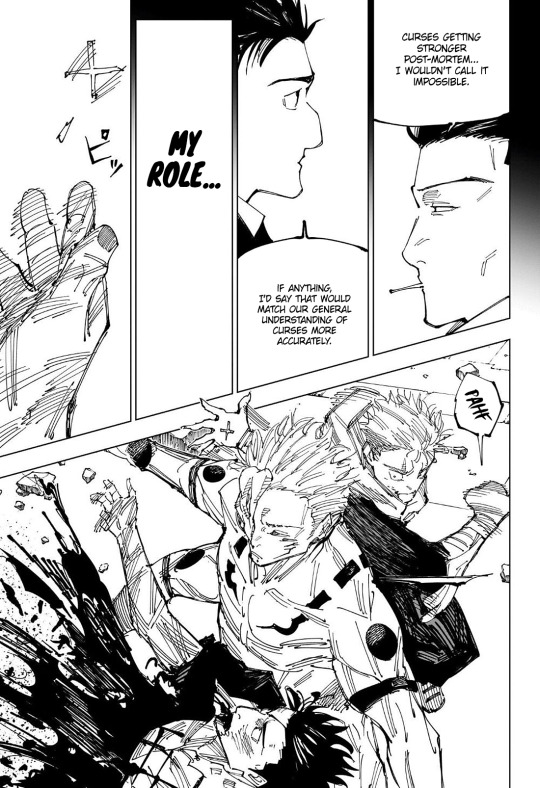

Yuji's cog comment connects back to Megumi's and demonstrates Yuji's growth as a jujutsu sorcerer. Many readers think Yuji's cog mentality holds him back, but I argue that it reflects his maturity into a fully realized sorcerer. After Higuruma's death, Yuji immediately takes the Executioner's Sword and tries to finish what his partner could not. Yuji's ability to keep fighting not only juxtaposes his failure in Shibuya, but also his maturity as a sorcerer.


The strength to fight on behalf of his fallen partner exemplifies Yuji's growth. Yuji's new blood manipulation powers will likely play an even greater role in Sukuna's ending, but he's already grown into a more grounded sorcerer. Yuji's strength lies in his team ups with his friends to achieve a united goal. With Maki returning, the two of them will work together to finally bring Sukuna down.
The choice between challenging Sukuna and worshipping him pervades even the modern era. The Jujutsu High political leaders feared Sukuna and his fingers. Even without a real body, Sukuna's cursed energy alone enforced fear and awe into jujutsu society. All sorcerers understood that his return would mean another schism; they would be required to either join him or foolishly challenge as a powerless upstart. Throughout history, sorcerers made binding vows with Kenjaku in order to one day challenge Sukuna, as Uro's squad once did. Others knew better and instead attempted to create a jujutsu society that worked to contain Sukuna in his cursed object form.
Sorcerers exist as cogs, forced to carry on each other's legacies and bear the burden of killing curses. Beyond that initial understanding, Sukuna exists as the craftsman that enforces conflict for his amusement. Sorcerers, ultimately, exist as Sukuna's toys. The final battle in Shinjuku Showdown will determine how the system, jujutsu society, might finally change if he dies.
42 notes
·
View notes
Text

November 19, 1946
Neither Victims nor Executioners
The Century of Fear
“The seventeenth century was the century of mathematics. The eighteenth century was the century of physical science, and the nineteenth the century of biology. Our twentieth century is the century of fear. Fear isn't a science, you may be thinking. Well, to begin with, science is no stranger to fear, since the latest theoretical advances have led science to repudiate itself, and since its practical applications threaten the entire earth with destruction. Furthermore, even if fear can't be considered a science in itself, there is no question that it is a method.
Indeed, what is most striking about the world we live in is first of all the fact that most people, broadly speaking, are deprived of any future (other than believers of one sort or another). No worthwhile life is possible without projection onto the future, without promise of development and progress. To live with one's back to a wall is a dog's life. But people of my generation and of the generation just now taking its place in factories and classrooms have lived and are living more and more like dogs.
Of course this is not the first time that people have faced a materially obstructed future. In the past, however, they used to overcome obstacles by speaking out or shouting out their discontent. They appealed to a different set of values, on which they pinned their hopes. Today, no one is talking (apart from those who repeat themselves), because the world seems to us to be led by forces blind and deaf to warnings, advice, and supplications. Something in us succumbed to recent experience. That something is man's eternal confidence, which always fostered the belief that we could elicit human reactions from other human beings by speaking to them in the language of humanity. We have witnessed lying, humiliation, killing, deportation, and torture, and in each instance it was impossible to persuade the people who were doing these things not to do them, because they were sure of themselves and because there is no way of persuading an abstraction, or, to put it another way, the representative of an ideology.
The long dialogue among human beings has now come to an end. And of course a man who cannot be persuaded is a man who makes others afraid. So that alongside people who stopped speaking because they deemed it pointless to try, a vast conspiracy of silence has arisen and continues to spread, a conspiracy accepted by those who quake in fear and who find every reason in the world to hide their quaking from themselves, and encouraged by those who find it in their interest to do so. "You must not talk about the purge of artists in Russia, because that would play into the hands of the reactionaries.” "You must keep silent about the British and American decision to keep Franco in power because to talk about it would play into the hands of communism." As I said earlier, fear is a method.
Between the very general fear of a war for which everyone is preparing and the very specific fear of lethal ideologies, it is therefore quite true that we live in terror. We live in terror because persuasion is no longer possible, because man has been delivered entirely into the hands of history and can no longer turn toward that part of himself which is as true as the historic part, and which he discovers when he confronts the beauty of the world and of people's faces. And because we live in a world of abstraction, a world of bureaucracy and machinery, of absolute ideas and of messianism without subtlety. We gasp for air among people who believe they are absolutely right, whether it be in their machines or their ideas. And for all who cannot live without dialogue and the friendship of other human beings, this silence is the end of the world.
In order to escape from this terror, we need to be able to think and to act on the basis of our thoughts. But the problem is that terror does not create a climate conducive to thinking. My view, however, is that rather than blame our fear, we should regard it as a basic element of the situation and try to remedy it. Nothing is more important, for this affects the fate of a large number of people in Europe, people who, having had enough of violence and lies, having seen their fondest hopes dashed, and being loath to kill their fellow human beings even in order to persuade them, are equally loath to see themselves persuaded in the same manner. Yet this is the dilemma that the vast masses of Europeans face, those who belong to no party or who are uncomfortable in the party they have chosen, who doubt that socialism has been achieved in Russia or liberalism in America, and yet acknowledge the right of people on both sides to assert their version of the truth while denying those same people the right to impose that truth by murder, either individual or collective. Among those who wield power today, these people are without a kingdom. They will be able to gain recognition for their point of view (without necessarily securing its triumph) and reclaim their homeland only when they can consciously formulate what they want and express this in terms simple enough and strong enough to bind a range of energies. And if fear is not the right climate for proper reflection, then they must first come to terms with fear.
In order to come to terms with fear, we need to understand what it signifies and what it rejects. It signifies and rejects the same fact: a world in which murder is legitimate and human life is considered futile. Therein lies today's primary political problem. Before dealing with the rest, we have to take a position on this. Before we can build anything, we need to ask two questions: "Yes or no, directly or indirectly, do you want to be killed or assaulted? Yes or no, directly or indirectly, do you want to kill or assault?” Anyone who answers yes to these questions is automatically caught up in a web of consequences that is bound to change the way in which the problem is posed. My aim is to detail just two or three of those consequences. In the meantime, honest readers may wish to ask themselves these questions and answer them.”
22 notes
·
View notes
Text
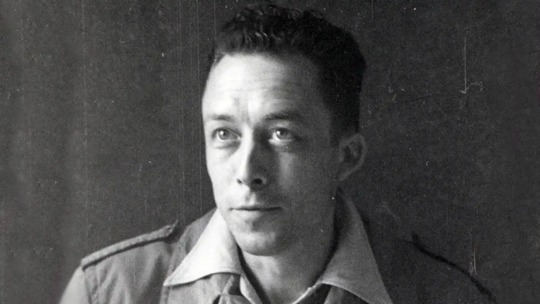
Though it may be true that, at least in history, values, be they of a nation or of humanity as a whole, do not survive unless we fight for them, neither combat (nor force) can alone suffice to justify them. Rather it must be the other way: the fight must be justified and guided by those values. We must fight for the truth and we must take care not to kill it with the very weapons we use in its defense; it is at this doubled price that we must pay in order that our words assume once more their proper power.
S’il est vrai qu’en histoire, du moins, les valeurs, qu’elles soient celles de la nation ou de l’humanité, ne survivent pas sans qu’on ait combattu pour elles, le combat (ni la force) ne suffit pas à les justifier. Il faut encore que lui-même soit justifié, et éclairé, par ces valeurs. Se battre pour sa vérité et veiller à ne pas la tuer des armes mêmes dont on la défend, à ce double prix les mots reprennent leur sens vivant.
—Albert Camus, “Chroniques algériennes,” (1958), reproduced in Essais (1965), p. 898
[Robert Scott Horton]
26 notes
·
View notes
Text

“This idea of an imminent death, closely bound moreover to the second coming of Christ, obsessed the entire first Christian generation. Herein lies the unique example of a collective experience of death. In the world of our experience, to realize this idea of death amounts to endowing our life with a new meaning. Actually, what is revealed here is the triumph of the flesh, of the physical terror before this appalling outcome. And it is no surprise that Christians have had such a bitter sense of the humiliation and anguish of the flesh and that these notions have been able to play a fundamental role in the development of Christian metaphysics. "My flesh is clothed with worms and dirt; my skin hardens, then breaks out afresh. My days are swifter than a weaver's shuttle, and come to their end without hope." As we see it, the Old Testament, with Job and Ecclesiastes, had already set the tone for this development.
But the Gospels have placed this sense of death at the center of their worship.
Actually, we are not sufficiently aware that Christianity is centered around the person of Christ and around his death. We turn Jesus into an abstraction or a symbol. But the true Christians are those who have realized the triumph of the martyred flesh. Jesus being fully human, the emphasis had been concentrated on his death, and one scarcely knows of a more physically horrible death. It is on certain Catalonian sculptures, on the broken hands and the cracked joints, that one must reflect in order to imagine the terrifying image of torture that Christianity has erected as a symbol, but it suffices just as well to consult the well-known texts of the Gospel.” (p. 47, 48)
22 notes
·
View notes
Photo

French comedian Jean Desailly paying tribute to Albert Camus during ceremony in Theatre de France, Paris, unveiling a bust of the writer in the presence of his wife Francine Camus on January 11, 1964.
[x]
6 notes
·
View notes
Text

"All that was left was this anguished heart, eager to live, rebelling against the deadly order of the world that had been with him for forty years, and still struggling against the wall that separated him from the secret of all life, wanting to go farther, to go beyond, and to discover, discover before dying, discover at last in order to be, just once to be, for a single second, but forever."
Albert Camus, The First Man
[x]
29 notes
·
View notes
Text
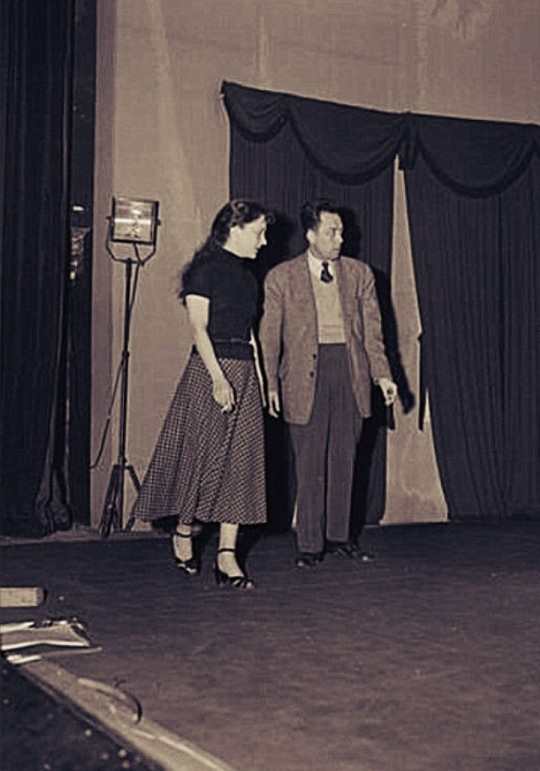
'Together once more! But never like tonight, and in spite of all the obstacles, I overflowed with gratitude, pride and tenderness. And when it's over in the hour of fatigue, your face that I cherish... To live at last! And life has no other face than yours. I'm holding your hand, very tightly, all this time.'
Albert Camus to Maria Casarès, December 17th 1949 (#107)
~~♡♥︎~~
quote credit: @acknowledgetheabsurd •~ photo credit: Emile Muller 1953
P.S. I'm aware of the fact how much poorer my life would have been if I hadn't come across translations of @acknowledgetheabsurd Camus-Casarès Correspondance. My bow down for your knowledge, persistence and love for Camus. And the biggest Thank You that our planet Earth (full of jealousy, ignorance and ungrateful people) can handle. In our world gratitude equals to absurdity. Isn't that absurd in its purest form? ;)
26 notes
·
View notes
Text
“You know and you must know now that I will always understand you, that nothing can change my love anymore. This is what I have discovered here. You would do the worst things, and against our very love, in spite of a suffering that I am physically afraid of because I know it, I would still love you and stay with you. These are reckless words (in every respect) and before I said them I thought about them a lot. But I must say them to you because I know now that they are true.”
— Albert Camus to Maria Casarès, Correspondance, February 13, 1950 [#189]
119 notes
·
View notes
Photo

The Department of Truth #4 Variant Cover (2020)
by Tradd Moore
After “The First Tribute to Columbus” by José Garnelo y Alda (1892) and “Fireside Angel” by Max Ernst (1937)
The Department of Truth is by James Tynion IV and Martin Simmonds
442 notes
·
View notes
Text

"Spectregraph" by Tradd Moore (2024)
Spectregraph created by James Tynion IV and Christian Ward
347 notes
·
View notes
Text
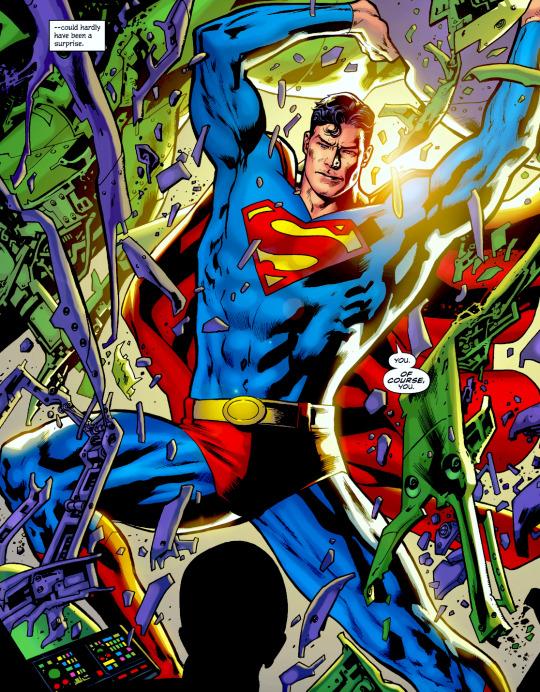
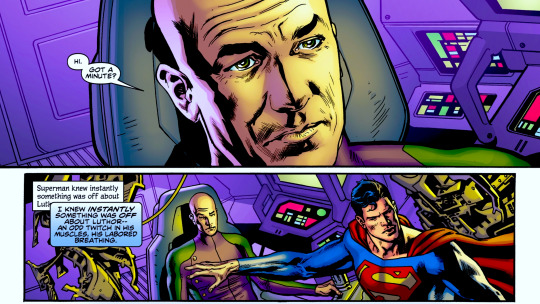
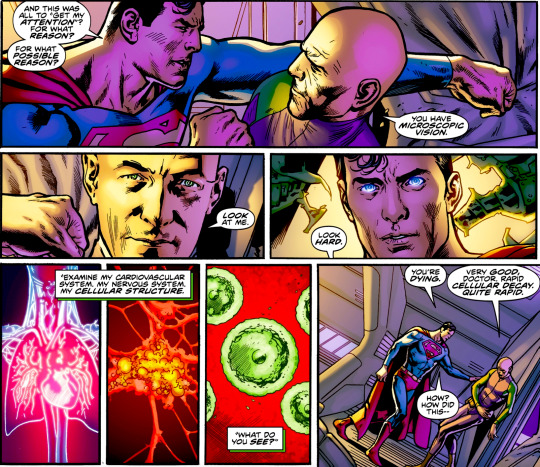
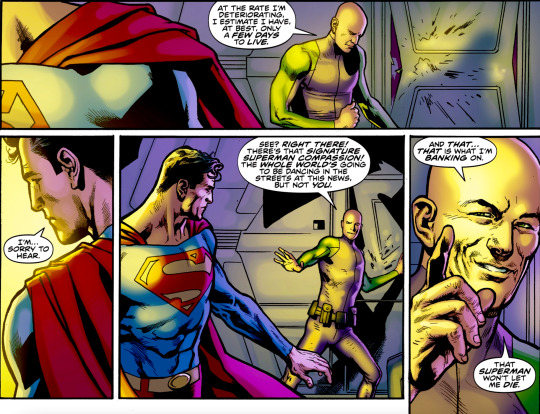
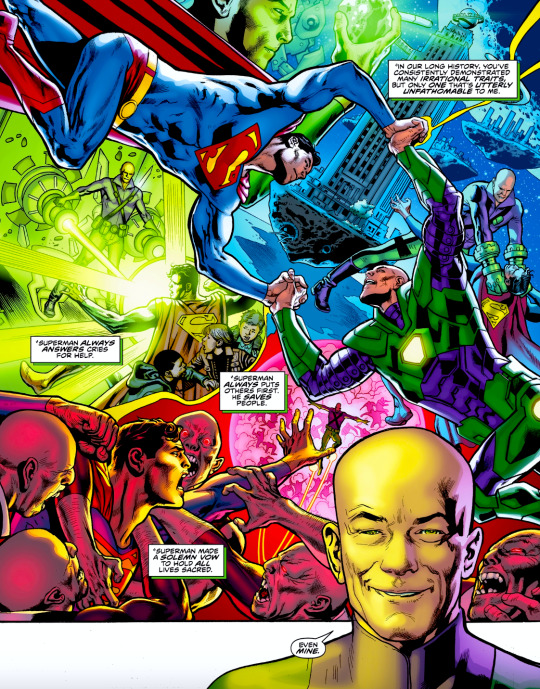
Superman ALWAYS helps Superman: The Last Days of Lex Luthor #1
56 notes
·
View notes
Photo


“I miss the city of tomorrow–
and the man of yesterday.”
the only people superman has inspired are those who would gun down pick-pocketers who leave the credit cards behind.
i suddenly have so much more respect for New Earth!Superman and what he means. how he inspires people.
as Mark Waid said, “Gods achieve their power by encouraging us to believe in them. Superman achieves his power by believing in us.”
when he stopped believing in people, he lost the kind of power that really mattered.
from Injustice: Gods Among Us #30
36 notes
·
View notes
Photo

From Action Comics Vol 1 #761 (2000) written Joe Kelly, pencilled by German Garcia, inked by Joe Rubinstein, coloured by Glenn Whitmore, lettered by John Costanza
Action Comics #761 is a strange story where Wonder Woman and Superman get stuck in Asgard and have to engage in a thousand year battle against demons and the like. Its implied Wonder Woman committed mass murder during this period, though this is the only death shown on panel.
14 notes
·
View notes
Text
I am. So fucking tired of Batman being portrayed as a bad parent and a toxic person. And it’s so goddamn widespread. Fuck, it might be as bad as the whole “Superman being a kindhearted Boy Scout is boring” take.
I get it, the man’s not exactly stable, he watched his parents get murdered in front of him and spent years of his life training to fight crime dressed like a giant scary bat, of course he’s not perfect.
But to say that Bruce Wayne isn’t caring, isn’t empathetic, to call him abusive…it just misses the point of who the character is to me.
Why do you think he fights crime? Yes, part of it is because he’s bitter and sad because his parents were cruelly ripped from him as a child, and he’s lashing out against the corruption of his city. It’s arguably the focus of his earlier years. But he learns to become more than that. He learns to bring hope, a chance to be better.
Harleen Quinzel is the Joker’s right hand lady, but she’s also a victim of an abusive relationship and a woman with a surprisingly strong moral compass and a love for animals, and wants to get better.
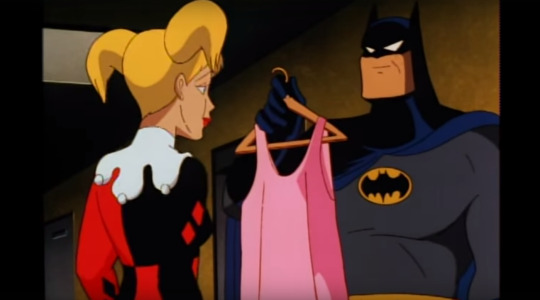
Harvey Dent is a man who will decide someone’s fate on a coin toss(and a pretty inaccurate depiction of DID), but he’s also Bruce’s close friend who clearly needs help learning to live with his condition, rather than try to get rid of it, and someone who he still goes out of his way to visit, even after everything.
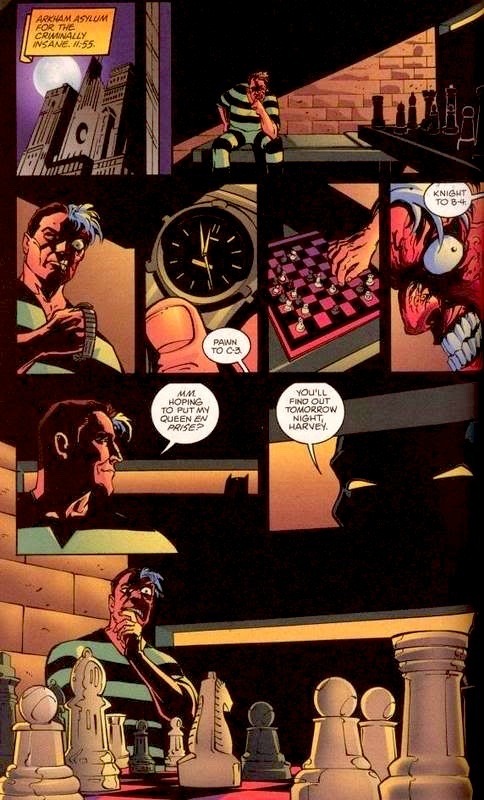
Victor Fries is a cold, emotionless man who will callously discard allies and blame them for being careless, but he’s also a man who’s either lashing out because he had the love of his life taken from him, or just desperate to make sure she isn’t taken from him, and is willing to do anything just to guarantee her survival.
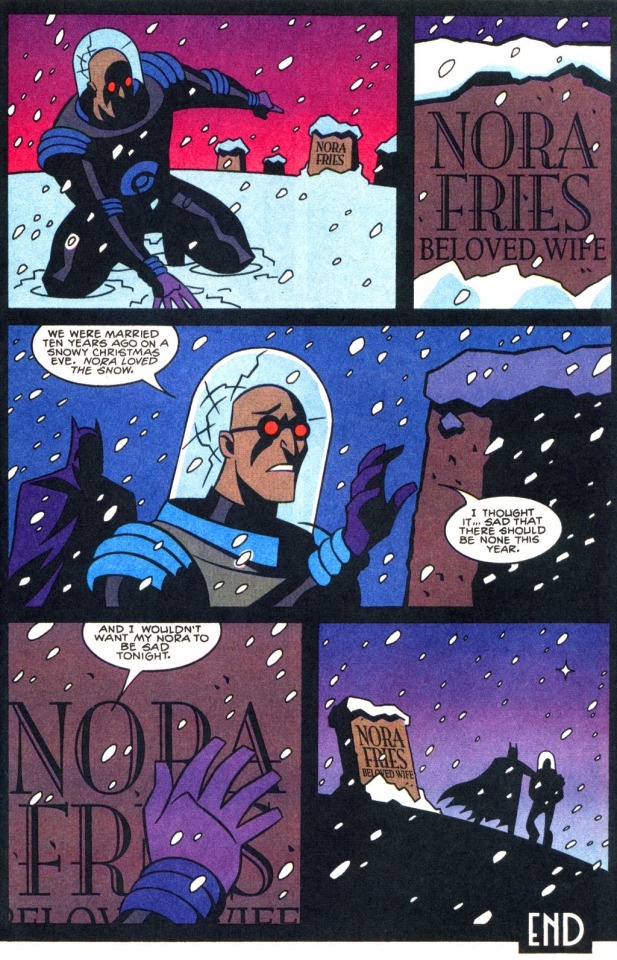
Even the Joker, arguably one of the most morally bankrupt characters in all of fiction, is someone that Batman has offered a chance to. After the guy shoots the daughter of his friend, a girl he cared for like she was his own kid, and paralyzes her from the waist down, he tells the Joker that he doesn’t want to hurt him. He wants to get him help. He looks at this monster who has taken countless lives and says “You don’t have to be alone.”
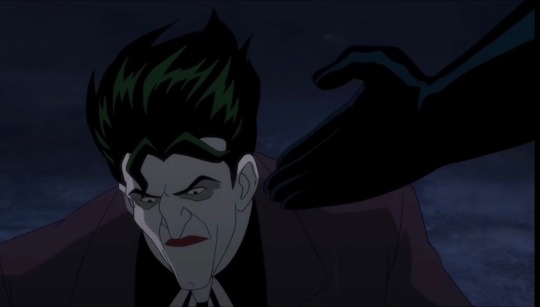
For fuck’s sake, he sat with Joe Chill in his last moments so that he wouldn’t be alone. Joe Chill, the man who murdered his parents, who took so much from him, the person responsible for all of the misery and suffering he’s gone through. And he sits with the man to comfort him while dies.
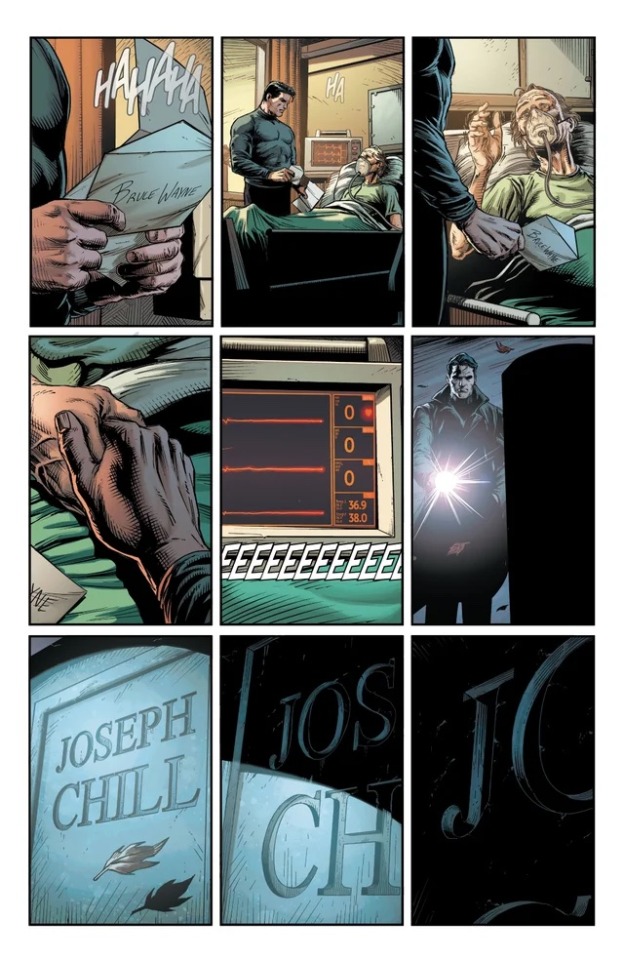
And you’re gonna tell me the man who did that would abuse his kids?
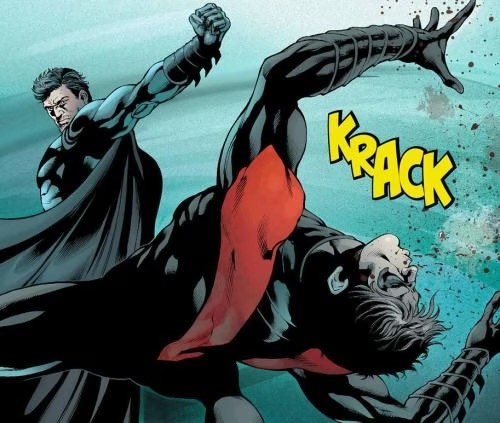
That he’d hold up the young man whose death was his greatest failure, the boy he grieved, and say this?

That he’d look his goddamn son in the eyes and say this to him?
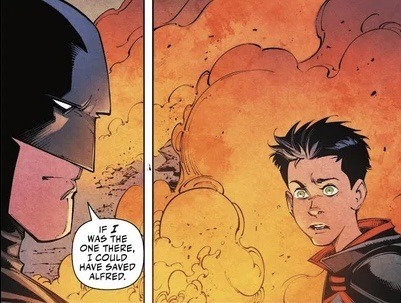
Why the FUCK do you think he took in Dick Grayson in the first place? It wasn’t because he saw the kid and thought “Ah. A potential soldier.”, it was because he saw a boy experiencing the same heartbreaking loss he had so many years ago, and wanted to make sure he didn’t end up as bitter and miserable as he was.
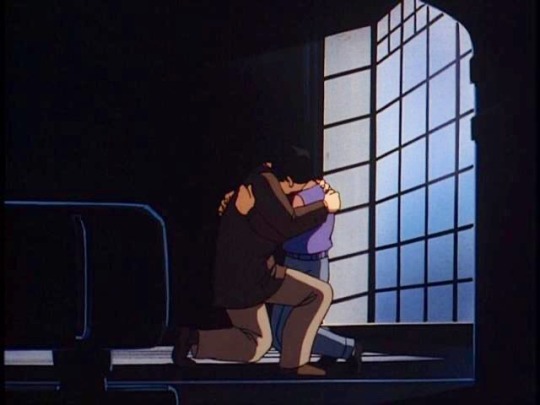
Why do you think he smiled when Tim Drake presented him a broken watch for Father’s Day? Because he was just happy to see the boy alive and safe.
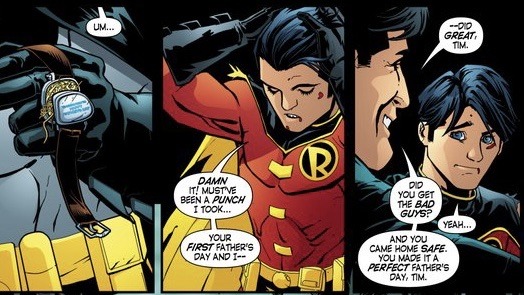
DAMIAN LITERALLY POINTED AT A COW AND SAID “I’m keeping her. She’s Bat-Cow.” AND BRUCE JUST WENT WITH IT. DIDN’T EVEN NEED TO ARGUE WHY BRUCE SHOULD LET HIM KEEP HER. HE SAID “this cow is my pet now” AND BRUCE SAID “alright, bet”.
The thing about Batman is that he wants to make sure nobody else ends up feeling the way he does. That’s not just about stopping a mugger so a boy’s parents aren’t gunned down. It’s about giving his loved ones the support and care that he couldn’t have, because it was taken from him. It’s about comforting someone who just went through a traumatic experience and letting them know that they’re going to be okay. It’s about going to someone locked away in a cell who thinks that they’re a lost cause and a burden to society and telling them that he wants to help them get better. It’s about EMPATHY.
That’s what makes him a HERO. He’s meant to inspire us, to show us that we can have that same empathy for others around us, that we can turn our suffering into hope for a better future.
I just wish more people at DC would start recognizing that. But I might as well follow that example myself. Maybe through this struggle of having to see this hero mistreat the people around him and act like a grade-A jackass, people will start to recognize that missing empathy, and slowly but surely, it might come back. After all, what is this post, if not trying to bring attention to the matter in the hopes of fixing it?
19K notes
·
View notes

